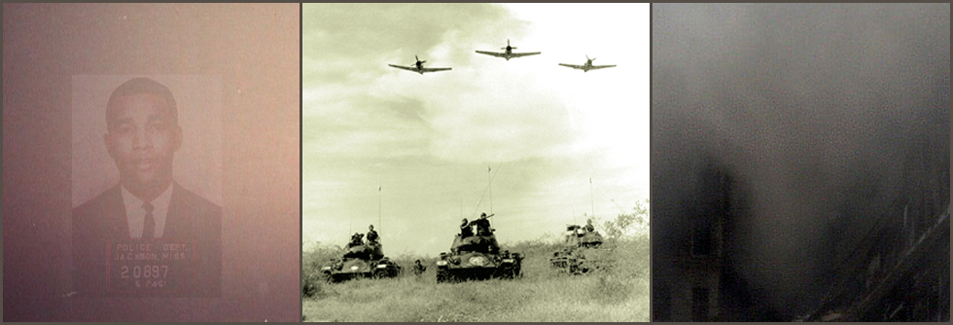| > |
92. The Promised Land
Written by Cedar Walton
Performed by Art Blakey And The Jazz Messengers
From the album 3 Blind Mice Volume Two (Blue Note, USA 1962)
Formed in 1954 and led by drummer Art Blakey, The Jazz Messengers were a straight ahead no frills hard bop outfit, whose ever changing line-up reads like a whose who of jazz: Curtis Fuller, Clifford Brown, Lou Donaldson, Hank Mobley, Jackie McLean, Keith Jarrett, Reggie Workman, Wynton Marsalis, Bradford Marsalis, Chuck Mangione are just some of the artists that were at one time or another part of Blakey’s group.
The Jazz Messengers toured and recorded for over thirty years, making them a highly regarded lynchpin in the post big band jazz world. Blakey encouraged his sidemen to contribute compositions, and this kept the Messengers output fresh and vibrant. Pianist Cedar Walton made a few contributions to this Blue Note recording made in March 1962, one of them being The Promised Land.
Here are a few things that took place in America around the time of the recording of this album.
One
February 1962. The campus of Southern University is still occupied by the state police and is under a political lockdown to suppress Congress of Racial Equality [CORE] -organized student protests. Twenty one year old Dion Tyrone Diamond — Freedom Rider, former Howard University student, and now Student Non violent Coordinating Committee [SNCC] field secretary — attempts to meet with the students. As Diamond arrives on the campus he is arrested by the Jackson Mississippi police department, and charged with trespassing, disorderly conduct, and vagrancy. Diamond is also charged with criminal anarchy — attempting to overthrow the government of the State of Louisiana — a major felony. Bail is set at $7,000, equal to $45,000 in 2006.
SNCC Chairman Chuck McDew and white field secretary Bob Zellner visit Diamond in jail to bring him reading material which includes material on the Scottsboro case, Eugene Burdick and William Lederer’s The Ugly American, and Richard Wright’s Eight Men. McDew and Zellner are arrested on charges of criminal anarchy: the local newspaper describes them as ‘Communists’ carrying ‘obscene’ literature on ‘race-mixing.’
Zellner is put in a cage holding more than 50 white prisoners. The guards make sure that the other inmates know he is a ‘race-mixer.’ Day after day, he is beaten and threatened with death while the guards look on. Eventually, Movement lawyers force the jailers to isolate him from the white prisoners. He is placed in solitary confinement in ‘the hole,’ a dark, sweltering hot, 5x7 steel cubical. McDew and Diamond are in similar adjacent cells.
After a month in jail, Dion Diamond’s bail is raised to $12,000 and the three are arraigned on the criminal anarchy charge. [1]
Here’s a testimonial from another SNCC member, singer Rutha Mae Harris, who toured extensively with the group, raising money for SNCC operations and ensuring the role of music in social protest: ‘We started singing songs at the mass meetings. Songs of the Movement gave you energy—a willingness and a wantingness to want to be free. Whenever there was a march to be taken place, there were songs that we would use to motivate the people to get in the line. One such song was ‘I Woke Up This Morning with My Mind Stayed on Freedom.’ Most of the songs from the Movement were taken from spirituals, gospel, and rhythm and blues – any type of music. Someone in the audience would start and say, ‘Come and go with me to that land. Come and go with me to that land.’ And the rest would just repeat it.’ [2]
Two
June 1962. Colin Powell, recently promoted to the rank of Captain in the U.S military, goes to Vietnam to serve as an advisor to the 400-man unit of the Army of the Republic of Vietnam. [3]
January 17 1963. South Vietnam. Monsoon season. Captain Powell jumps from a military helicopter into a densely forested combat zone of the A Shau valley, not far from the Laotian border. This will be Captain Powell’s first and only combat experience. A foot infection from a Vietnamese booby trap – an excrement-poisoned bamboo spear – puts paid to his tour of duty. [4]
Three
October 22 1962. President John F Kennedy addresses America in a televised speech, announcing the presence of offensive missile sites in Cuba. [5] In Birmingham, Alabama, news of the threat of war frightens seven-year old Condoleeza Rice: she fears her parents will be unable to protect her should the threat become a reality. [6]
September 15 1963. Ku Klux Klan members bomb the 16th Street Baptist Church, killing four girls, one of whom is Rice’s friend,[7] eleven-year old Denise McNair. [8]
Sources
[1] ‘Veterans of the Civil Rights Movement – Timeline’,www.crm.org/tim/timhis62htm
[2] Library of Congress Exhibition:
voices of the civil rights.
[3 & 4] ‘Behind Colin Powell’s Legend’, by Robert Parry &
Norman Solomon, consortiumnews.com, December 17, 2000
http://www.consortiumnews.com/2000/121700b.html
[5] ‘Cuban Missile Crisis: Timeline’, http://library.thinkquest.org/11046/days/timeline.html
In Birmingham
[6 & 7] Condoleezza Rice: A
Biography, by Jacqueline Edmondson, Greenwood Publishing
Group, 2006
http://books.google.co.uk/books?id=YWcX0F0o88cC&pg=PR19&lpg=PR19&dq=Condoleezza+Rice+Timeline&source=web&ots=tenRv635W0&sig=XmNBqE2w02p-goPMxH0YrhQ0NBs&hl=en&sa=X&oi=book_result&resnum=10&ct=result
[8] http://www.spartacus.schoolnet.co.uk/USAC16.htm
| < | > |
